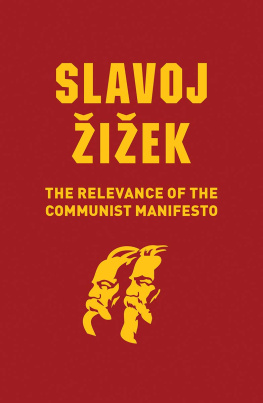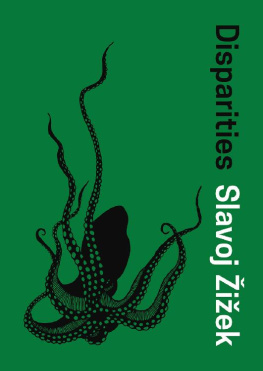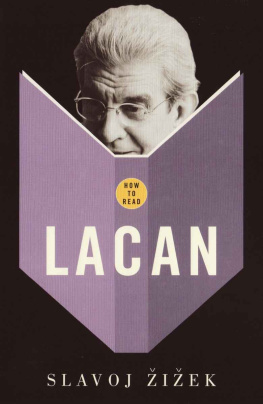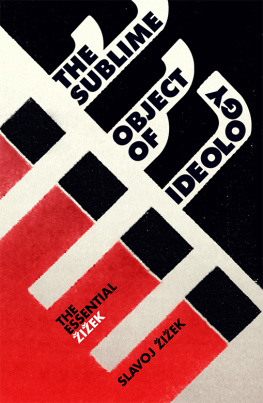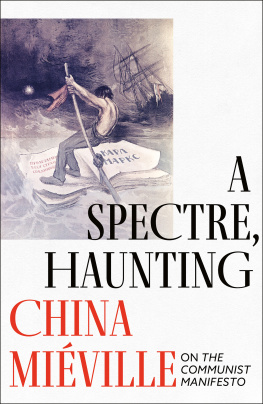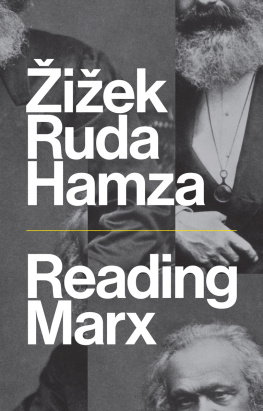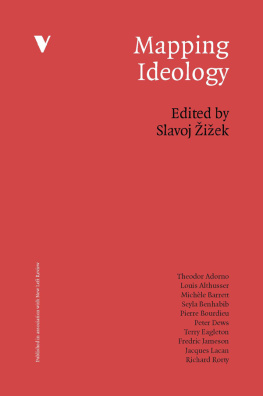CONTENTS
Guide
Pages

The Relevance of the Communist Manifesto
Slavoj iek
polity
First published in German as Die versptete Aktualitt des Kommunistischen Manifests S. Fischer Verlag GmbH, Frankfurt am Main, 2018
This English edition Polity Press, 2019
Polity Press
65 Bridge Street
Cambridge CB2 1UR, UK
Polity Press
101 Station Landing
Suite 300
Medford, MA 02155, USA
All rights reserved. Except for the quotation of short passages for the purpose of criticism and review, no part of this publication may be reproduced, stored in a retrieval system or transmitted, in any form or by any means, electronic, mechanical, photocopying, recording or otherwise, without the prior permission of the publisher.
ISBN-13: 978-1-5095-3612-2
A catalogue record for this book is available from the British Library.
Library of Congress Cataloging-in-Publication Data
Names: Zizek, Slavoj, author.
Title: The relevance of the Communist manifesto / Slavoj Zi?ek.
Description: Cambridge, UK ; Medford, MA : Polity Press, [2019] | Includes bibliographical references and index.
Identifiers: LCCN 2018043366 (print) | LCCN 2018045327 (ebook) | ISBN 9781509536122 (Epub) | ISBN 9781509536108 (hardback) | ISBN 9781509536115 (pbk.)
Subjects: LCSH: Marx, Karl, 1818-1883. | Marx, Karl, 1818-1883. Manifest der Kommunistischen Partei. | Capitalism--Social aspects.
Classification: LCC HX39.5 (ebook) | LCC HX39.5 .Z59 2019 (print) | DDC 335.4/22--dc23
LC record available at https://lccn.loc.gov/2018043366
The publisher has used its best endeavours to ensure that the URLs for external websites referred to in this book are correct and active at the time of going to press. However, the publisher has no responsibility for the websites and can make no guarantee that a site will remain live or that the content is or will remain appropriate.
Every effort has been made to trace all copyright holders, but if any have been overlooked the publisher will be pleased to include any necessary credits in any subsequent reprint or edition.
For further information on Polity, visit our website:
politybooks.com
The end is near only not the way we imagined it
There is an exquisite old Soviet joke about radio Erevan. A listener asks: Is it true that Rabinovitch won a new car on lottery? The radio answers: In principle yes, its true, only it wasnt a new car but an old bicycle, and he didnt win it but it was stolen from him. Does exactly the same not hold for The Communist Manifesto? Lets ask radio Erevan: Is this text still actual today? We can guess the answer. In principle, yes: it describes wonderfully the mad dance of capitalist dynamics, which reached its peak only today, more than a century and a half later; but Gerald A. Cohen enumerated the four features of the classic Marxist notion of the working class: (1) it constitutes the majority in society; (2) it produces the wealth of society; (3) it consists of the exploited members of society; (4) its members are the needy people in society. When these four features are combined, they generate two further features: (5) the working class has nothing to lose from revolution; (6) the working class can and will engage in a revolutionary transformation of society. None of the first four features applies to todays working class, which is why features (5) and (6) cannot be generated. (Even if some of the features continue to apply to parts of todays society, they are no longer united in singe agent: the needy people in society are no longer the workers, etc.) Correct as it is, this enumeration should be supplemented by a systematic theoretical deduction: for Marx, they all follow from the basic position of a worker who has nothing but his labour power to sell. As such, workers are by definition exploited; with the progressive expansion of capitalism, they constitute the majority which also produces the wealth; and so on. How, then, are we to find a revolutionary perspective and redefine it in todays conditions? Is the way out of this predicament a combinatorics of multiple antagonisms, their potential overlapping? But to use Laclaus terms how is it possible to form a chain of equivalences from classic proletarians, precariat, unemployed, refugees, oppressed sexual and ethnic groups, and the like?
A good starting point here would be to follow the good old Marxist path and shift the focus from politics to the signs of postcapitalism that are discernible within global capitalism itself. And we dont have to look far: the public figures who exemplify the privatization of our commons Elon Musk, Bill Gates, Jeff Bezos, Mark Zuckerberg, all socially conscious billionaires leave bagfuls of warnings in their trail. They stand for global capital at its most seductive and progressive in short, at its most dangerous. (In a speech to Harvard graduates in May 2017, Zuckerberg told his public: Our job is to create a sense of purpose! This comes from a man who, with Facebook, has created the worlds most expansive instrument of purposeless loss of time.) From Zuckerberg to Gates and Musk, they all warn that capitalism as we know it is approaching its end and advocate countermeasures such as minimal income. One cannot but recall here the famous Jewish joke quoted by Freud: Why are you telling me you are going to Lemberg when you are really going to Lemberg? Here a lie assumes the form of a factual truth: the two friends established an implicit code by which, when you plan to go to Lemberg, you announce that you will go to Cracow and vice versa, so that, within this space, telling the literal truth means lying. And is it not the case that exactly the same holds for Zuckerberg, Musk, and other false prophets of the end of capitalism? We should simply reply to them: Why are you telling us that capitalism is coming to an end when capitalism is really coming to an end? In short, their version of the end of capitalism is the capitalist version of its own end, where everything will change so that the basic structure of domination will remain the same
More serious is the rise of what Jeremy Rifkin calls the collaborative commons (CC), a new mode of production and exchange that leaves behind private property and market exchange: in CC individuals are giving their products for free, releasing them into circulation. This emancipatory dimension of CC should, of course, be located in the context of the rise of what is called the internet of things (IoT) in combination with another result of todays development of productive forces: the explosive rise of zero marginal costs whereby more and more products, and not only information, can be reproduced for no additional costs. The IoT is the network of physical devices, vehicles, buildings, and other items embedded in electronics, software, sensors, actuators, and network connectivity that enable these objects to collect and exchange data; it allows objects to be sensed and controlled remotely, across an existing network infrastructure. Thus the IoT creates opportunities for a more direct integration of the physical world into computerbased systems and causes improved efficiency, accuracy, and economic benefit across the board. When the IoT is augmented with sensors and actuators, the technology becomes an instance of the more general class of cyberphysical systems, which also encompass technologies such as smart grids, smart homes, intelligent transportation, and smart cities; each thing is uniquely identifiable through its embedded computing system and is able to interoperate within the existing internet infrastructure. The interconnection of these embedded devices (including smart objects) is expected to usher in automation in nearly all fields, while also enabling advanced applications such as a smart grid and expanding to the areas such as smart cities. Things can also refer to a wide variety of devices such as heart-monitoring implants, biochip transponders on farm animals, electric clams in coastal waters, automobiles with built-in sensors, and DNA analysis devices for environmental, food, or pathogen monitoring. These devices collect useful data with the help of various existing technologies and then autonomously reflow these data between other devices. Human individuals, too, are things whose states and activities are continuously registered and transmitted without their knowledge: their physical movements, their financial transactions, their health, their eating and drinking habits, what they buy and sell, what they read, listen to, and watch are all collected in digital networks that know them better than they know themselves.

